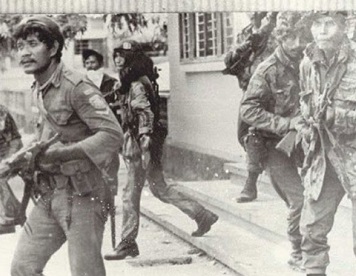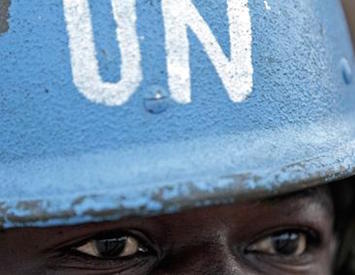Archival documents show the British Government – like Australia and the U.S. – actively assisted Indonesia cover up crimes against humanity in East Timor. Dr Adam Henry reports.
In recent research in the National Archives (UK) regarding the British Foreign and Commonwealth Office (FCO) and East Timor, three things emerged repeatedly.
The first was that the British had clear information (both from their own sources) and by liaison with friendly Embassies (such as the Australian) on almost all events and developments inside East Timor before and after the Indonesian invasion of East Timor of 1975.
Second, the British (like their Australian counterparts) were very well informed about numerous human rights abuses committed by the Indonesian military during and after the invasion.
Thirdly, the British (like their Australian counterparts) were committed to undermining the question of East Timorese human rights in favour of expanding diplomatic and economic relations with Jakarta. Here we have an example of nations particularly fond of lecturing others about human rights knowingly and flagrantly enabling crimes against humanity (if not genocide) to occur. The United States, along with Australia, Britain, Japan, Europe, Canada and others, were committed to expanding ties with the Suharto regime — the perpetrators of great crimes. Indeed, the U.S. and UK (including Australia) maintained military ties, vital weapon sales and continuously provided diplomatic cover for the Indonesian military while it committed these crimes. Without such support – freely given and blatant in its near total ethical disregard for spirit of international law – the Indonesian military could never have seriously contemplated any war of aggression against East Timor, let alone a 25-year occupation claiming the lives of up to 200,000 men, women and children.
It is important to emphasise that the information about events in East Timor was most often highly accurate. This is not only demonstrated by the documentation with have in the present about what occurred between 1975 and during 1999 – when Indonesian authorities orchestrated one last crime against humanity following the independence referendum – but in the Australian, British and American archives.
Confidential Report in UK Policy toward East Timor FCO15/2992, National Archives, United Kingdom, 1981 (Page 10)
There were two shields that protected the perpetrators in East Timor. The first was that they were actively supported by the Australians, British, Americans, Japanese, Europeans and so on. The second was that the Indonesians were hostile to any independent witnesses (media or any other organisations) likely to report critically on what was occurring. Once in occupation, the Indonesians virtually cut East Timor off from the outside world (other than officially approved visitors).
Notoriously, five Australian, New Zealand and British journalists were deliberately murdered by Indonesian special forces (and axillaries) in Balibo during October 1975, while another Australian journalist Roger East was later murdered in Dili in December 1975 by Indonesian forces and thrown into the harbour. Despite the severe restrictions placed on East Timor, testimonies, refugees and other sources continued to provide accurate information for human rights supporters and advocates outside. Journalists such as (IA contributor) John Pilger even secretly entered the territory and filmed the documentary Death of a Nation highlighting not only the human rights catastrophe, but the complicity of the Australians, British and Americans. Other journalists such as Max Stahl and Amy Goodman were instrumental in filming and witnessing the Dili Massacre. However, there were also others extremely well informed about events within East Timor and Indonesia in general – the governments of Australia, Britain and the United States.
Grassroots human rights advocacy on East Timor faced a major challenge in the UK, as it did in Australia and the U.S., but not because of the threat of official violence or oppression. The activities of the East Timorese Information Network, for example, in Australia (and similar organisations in Britain) assembled an impressive array of analysis and publications. Friends of East Timor groups (and other human rights advocates) in both nations were never short of information to highlight the plight of Portuguese Timor or physically prevented from making their information public. There are of course numerous individuals who tirelessly advocated and supported the cause of human rights in East Timor, many more then could be named in one short article. But a few examples highlight the detailed accuracy of the information they provided on the topic. For example, James Dunn's research and analysis of Portuguese Timor (at all stages) highlighted the ethical issues at stake often in painstaking detail. Also, Carmel Budiardjo, who founded the TAPOL organisation in 1973, who documented the clear and ongoing oppression suffered by political prisoners in Indonesia and human rights abuses in East Timor, West Papua and other provinces. Others, like Hugh Dowson, whose personal commitment to human rights in East Timor not only inspired serious research uncovering the complicity of the British government, but conducted a 100 hour fast in order to bring attention to the cause. The late Dr Andrew McNaughton was not only dedicated to the cause of human rights in East Timor risking his own life to document human rights abuses he produced documents demonstrating direct culpability of the Indonesian authorities.
It is difficult to imagine from archival sources (particularly diplomatic) that there was much reported about East Timor from non-official sources that was unknown or particularly surprising to the Western diplomatic establishment. When "power" is not only well informed about various crimes, but becomes actively complicit in these crimes then those ‘speaking truth to power’ merely become an irritation to be managed. From the very beginning (even before the Indonesian invasion) the concern regarding Indonesia was to continue building the relationship with President Suharto and the Indonesian military. Neither the massacres of 1965-1966 (where an army led slaughter of at least 500,000 people occurred), or The Act of Free Choice in West Papua in 1969, had dented the enthusiasm of Canberra, London or Washington for Suharto. Reports of the massacres and oppression in West Papua becoming little more than a public relations issue. There was no intention of ever seriously pressing Suharto or the Indonesian military over their human rights record. Therefore, East Timor merely continued an established paradigm around the relationship with Suharto which was the primary concern irrespective. The publication of critical material highlighting human rights abuses and crimes against humanity in East Timor (as it was elsewhere) was problematic because Canberra, London, Washington etc. were determined to carry on the relationship with Jakarta.
Crimes against humanity as serious as what had already occurred in 1965-1966, West Papua and then later East Timor could each have warranted prosecutions under international law and justified the diplomatic isolation of Suharto’s Indonesia. The rationale for adhering to international law being more than an adequate explanation for punishing the perpetrators of these crimes. There is an important difference: Indonesia under Suharto, and the military, were cultivated as an important diplomatic and strategic ally, and “their crimes” were not merely ignored they were supported. Therefore, information highlighting the reality of Indonesia’s human rights record (and its array of crimes in East Timor) were to be managed while trying to minimise potential diplomatic damage.
This pattern was held virtually until the very end of Indonesian rule in 1999 and was only broken then when the public outcry over Indonesian actions following the referendum demanded action. Within the Australian or British documents, there seems to have been very little internal questioning about the ethical or moral propriety of associating so closely – economically, militarily, or diplomatically – with those responsible for a systematic crime against humanity over such a long period of time (1975-1999).
In examining Australian and British diplomatic documents on Portuguese Timor, the major concern of the Australian and British governments was clearly not "human rights" or "international law", but the relationship with Suharto. Although Suharto is long gone, the Indonesian military continue an established pattern of abuses in West Papua. The question of "human rights" were largely irrelevant to official policies, apart from (as already noted) the question of the public embarrassment certain revelations might cause. Human rights abuses in East Timor committed by the Indonesian military and security forces were known to the Foreign and Commonwealth Office (FCO) and others. Archival documents show beyond any shadow of doubt that the British had little to no concern about what the Indonesians would and then did do in East Timor.
Even the deliberate murder of two British journalists, (members of The Balibo Five) was treated as a potential public relations obstacle. So much so, that despite two of the murdered journalists being UK born, the British wanted nothing to do with the matter, leaving all responsibility for investigation to Canberra. The Australians, of course, had little bureaucratic or diplomatic enthusiasm to confront the perpetrators of the crime and only the potential public outcry (and ongoing advocacy) forced them to carry out any investigations at all. The inadequacies of Australian investigations (or cover up) were clearly demonstrated by the Pinch Coronial Inquiry into the death of Brian Peters.
FCO Guidance for Government MPs and Peers Supplementary Questions (on East Timor) in UK Policy toward East Timor FCO15/2992, National Archives, United Kingdom, 1981
The British archival documents also show the PR strategies of the FCO designed to undermine human rights advocacy on East Timor, cast doubts over Indonesian human rights allegations and minimise public knowledge regarding the true intentions of British foreign policy. At the core of these were British trade relations with Jakarta (particularly opportunities to sell UK arms). This PR strategy required no serious questioning of the information provided about human rights allegations. Instead, the FCO could smear the reputations of human rights advocates, such as James Dunn or Carmel Budiardjo, with internal gossip and hearsay. Detailed human rights allegations were belittled as not being particularly serious, that the worst of these excesses had now passed and things were improving, or that advocates for East Timor were in some way driven by an irrational or unreasonable mission.
The PR strategy revealed in the British archival documents is striking; in some cases the FCO seemingly sought out the Indonesians themselves about human rights allegations. Presumably, the Indonesians could then supply the FCO their rebuttals, which would naturally be quoted in official correspondence. The FCO also provided detailed internal information guidance to various politicians to help shape answers regarding East Timor and human rights. A particularly ferocious advocate defending the Indonesians was Baroness Vickers in the House of Lords.
While public declarations of Britain’s long standing commitment to international law and principles of self-determination were reassuring, they were a gross misrepresentation of the true British position on East Timor. The FCO reaction to queries and reports about the human rights situation in East Timor sought to explore ways to sideline and indeed publicly sidestep the validity of the criticisms, but again they understood very well from a range of sources (including their own) most of these reports highlighted real abuses. The ongoing dedication of those supporting human rights in East Timor were then an irritation to be managed, and for a great deal of the period in question, the public profile of East Timor was not high in mainstream coverage. Sir Allan E. Donald, Assistant Under Secretary FCO Asia/Far East, South East Asia (1980-84) and later Ambassador to Indonesia (1984-1988), annotated a 1981 FCO document highlighting the lack of media interest in East Timor. This was no doubt pleasing to the FCO.

Annotation on Letter from KFX Burns South East Asian Department, 23 June 1981 in in UK Policy toward East Timor FCO15/2992, National Archives, United Kingdom
In terms of sheer scale, the atrocities committed by the Indonesians between 1975 and 1980 alone, the ability to overlook such crimes against humanity required great commitment from the Australians, British and Americans to maintain their relationship with the perpetrators. At least 80,000 Timorese (possibly much higher) died as a direct and indirect result of the Indonesian invasion and occupation during these years alone. In that time, the Australians, British and Americans had not only acquiesced to the Indonesian invasion, provided diplomatic and material support for the occupation, they also sought to further their own interests by expanding the relationship with Suharto.
For the British and Americans, this involved the sale of weapons which would be used directly in East Timor and West Papua. For the Australians, this would involve providing de jure recognition of the Indonesian occupation in return for beginning negotiations over maritime boundaries in 1979. By closing the Timor Gap, the Australians would eventually gain access to Timorese oil and gas. Archival documents show that the British were concerned to explain to the Indonesians that, while they supported – and, indeed, agreed with the Australians moves from 1978 to offer de facto and then de jure recognition in 1979 – they could never publicly do likewise. Publicly, the British would maintain the fiction of supporting the principle of self-determination, privately they would do nothing to regarding the Indonesian occupation of East Timor. The British wanted the Indonesians to understand that they wished to avoid any UK overseas territories or colonies coming under scrutiny regarding self-determination. The lives of the East Timorese being obviously irrelevant to such thinking.
In no page of the many documents examined at the UK National Archives is there even the slightest concern or contrition over the fate of the East Timorese — only the problem of how to continue the relationship with the perpetrators. There is little doubt that East Timor is more significant demographically and statistically than many other terrible modern examples often labelled "genocides" or "ethnic cleansing". It is telling that human rights advocates discussed in the FCO documents provided information that was not only highly accurate at the time events were occurring, but that governments – all well informed of the realities of East Timor – remained steadfast in their determination to ignore their work.
The rape of East Timor: 'Sounds like fun' https://t.co/3rFQ688MlD @IndependentAus
— dafrinskipperstarufo (@dafrin_51) March 3, 2016
Human rights advocates, therefore, should not assume that in speaking truth to power they speak to the ignorant – as Noam Chomsky has noted – such people already possess a far more complete truth particularly when they are closely complicit to the crime. However, in bearing public witness, this can be a catalyst for public action and organisation. Continued advocacy highlights that those hoping to hide their complicity behind weasel words find this advocacy simultaneously irritating, provocative, and potentially personally embarrassing. It is therefore important to carefully document the true record of "power" over issues like East Timor reminding those who would prefer to forget their actions of their selective disregard for human rights in pursuit of base self-interest.
This is an abridged version of an article originally published at the Human Rights Consortium at the University of London on 28 June 2017 entitled 'Reminding "Power" about the historical importance of "Truth"' and has been published with permission.
Dr Adam Hughes Henry was a visiting fellow at the Human Rights Consortium, School of Advanced Study, investigating British documents related to human rights abuses in East Timor. Dr Henry is currenty visiting fellow at the School of Culture, History and Language at the Australian National University.
Australia's complicity in the East Timor atrocities is ongoing https://t.co/RRsatjjX5z @IndependentAus
— Dave Donovan (@davrosz) August 10, 2016
Monthly Donation
Single Donation
Uncover the truth. Subscribe to IA.













